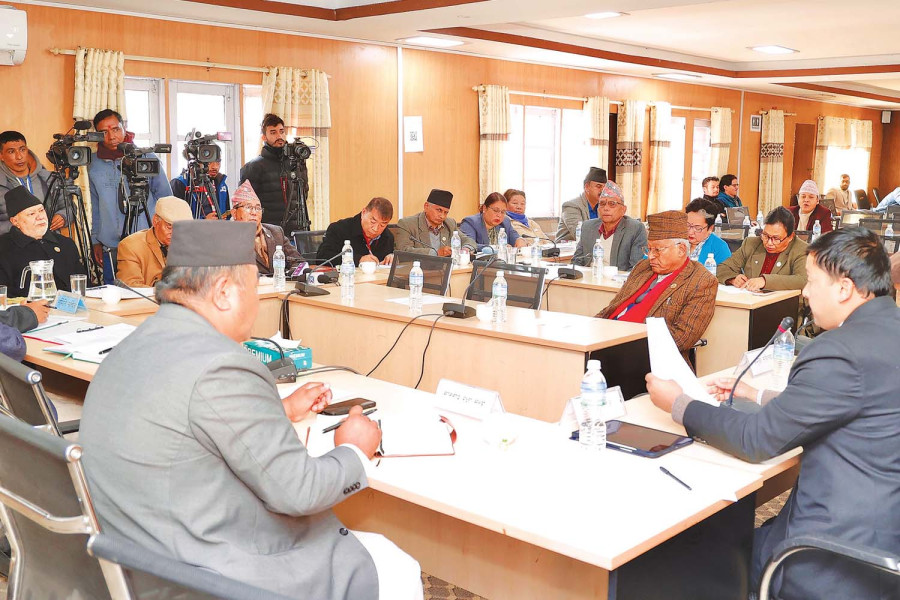Politics
Lawmakers want ban on politically-affiliated trade unions in civil service
Some advocate for an umbrella trade union where all civil servants can be adjusted.
Post Report
Lawmakers from various political parties have stood for dissolving politically-affiliated trade unions in civil service and allowing civil servants to get organised under an official trade union, which would work as an umbrella organisation.
Shyam Kumar Ghimire, chief whip of the ruling Nepali Congress, has said that no trade union associated with any political parties should be allowed to operate in civil service. According to Ghimire, Congress believes that political party’s unions should not be allowed to function in the bureaucracy.
He was speaking on the bill to regulate the formation, operation, and conditions of federal civil service at the State Affairs and Good Governance Committee meeting on Thursday.
Ghimire said those on the government payroll should not participate in trade union's activities.
“In civil service, trade unions shouldn't be formed based on their party allegiance,” Ghimire said. “If a trade union is needed, there could be an official one where every civil servant can be a member.”
The restoration of multi-party democracy in Nepal in 1990 opened the space for civil society organisations, including trade unions. The registration of trade unions started in 1993.
Devraj Dahal, a researcher who has extensively studied the necessity of establishing trade unions in Nepal, says that at that time, labourers around Nepal were getting the short end of the stick, which is one reason why trade unions were established in Nepal. Trade unions, or labour unions, are formed to advocate the rights of labourers and improve their working conditions.
“Trade unions are needed to create a just society, but in Nepal, those unions have been working as proxy agencies of political parties, to advance their vested interests,” Dahal said. “Hence, their relevance can be questioned.”
Dahal added that trade unions are concentrated in Kathmandu and they have failed to work in the interest of labourers outside cities who might be in most need of their advocacy.
Congress lawmaker Ghimire told the Post that when every party has its trade union in the civil service or any other institutional organisations, they may support respective party’s sister wings but will not benefit the larger society.
“It is high time that the country dissolved trade unions affiliated to political parties and marched ahead for the development of the country,” Ghimire said.
Rastriya Prajatantra Party (RPP) whip Bina Lama shared a more radical view at the same meeting. She said that trade unions should be completely abolished in the civil service to help bureaucracy function effectively.
“Trade unions have become parties’ recruitment centres in the bureaucracy,” Lama said. “To prevent it from being expanded further, the law should prevent civil servants from joining political parties or their sister organisations.”
However, Dahal differed. “Nepal is a signatory to many international treaties, which oblige us to do so. Therefore, the country cannot fully eradicate trade unions,” he said. Instead of making it a recruitment centre for political parties, as the Congress chief whip Ghimire said, Dahal advocates an umbrella trade union where all can be adjusted.
“In most Western countries, including Germany, there is one official trade union that works efficiently,” Dahal added.
The draft of the Federal Civil Service Act, sent by the Ministry of Federal Affairs and General Administration for discussion in the State Affairs and Good Governance Committee of the Parliament, also proposes approval of one official trade union for government employees at the federal and provincial levels.
While speaking on the bill in the same meeting, Mahesh Bartaula, the chief whip of ruling party CPN-UML, stood in favour of fixing the term of reservation quota for a single person in the civil service. It means a single person should be allowed to get a government position under reservation quota for a single opportunity and then the person should compete under open category for other positions.
“How long will we give the facility of reservation repeatedly for a single person? It is wrong to provide reservation to the same person in every post within the service,” Bartaula further said. “Reservation should be allowed for a person only once and it should be on the basis of class.”
Bartaula also advocated for the two year cooling period for government officials while joining national and international organisations after their retirement.




 20.9°C Kathmandu
20.9°C Kathmandu














